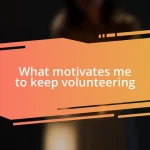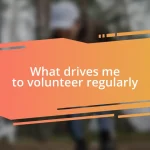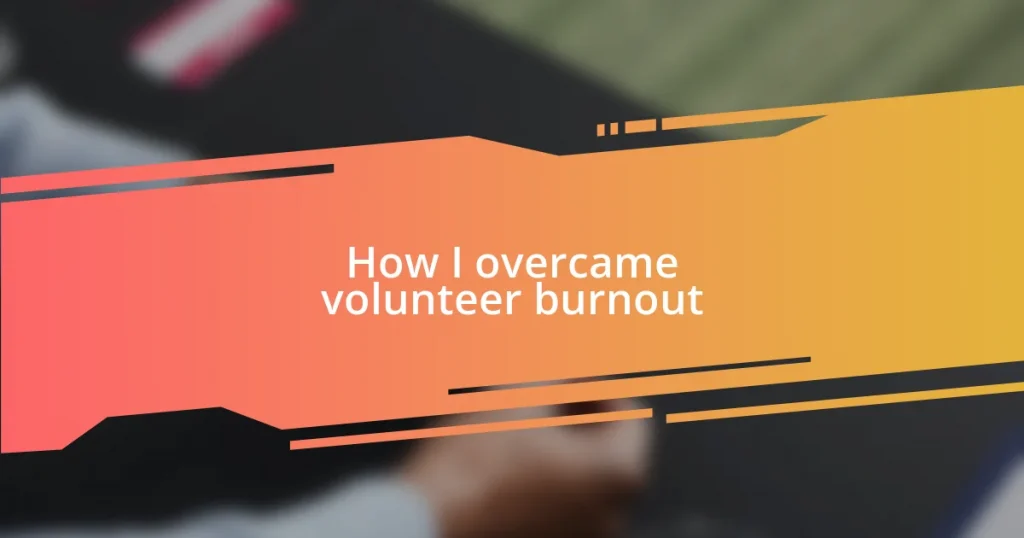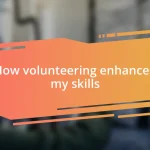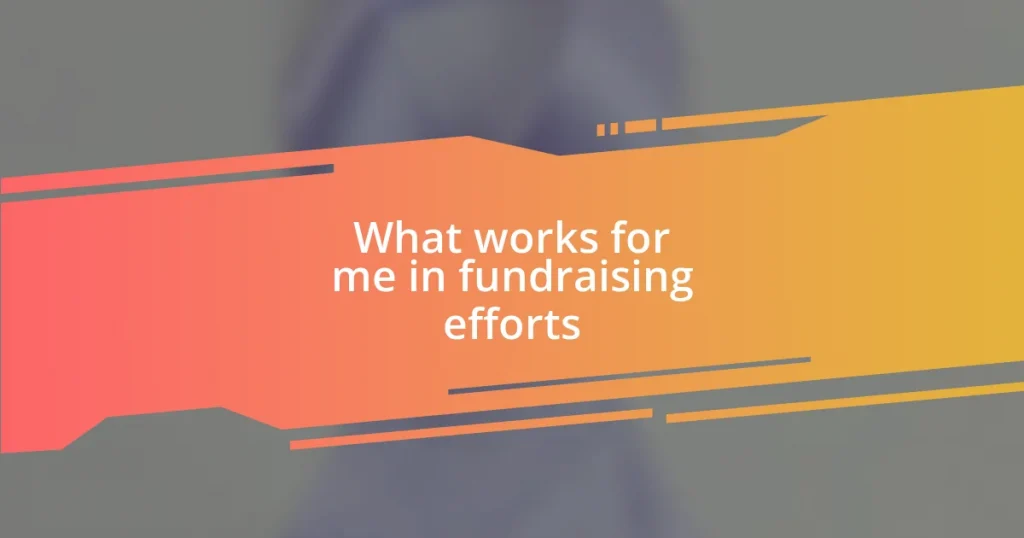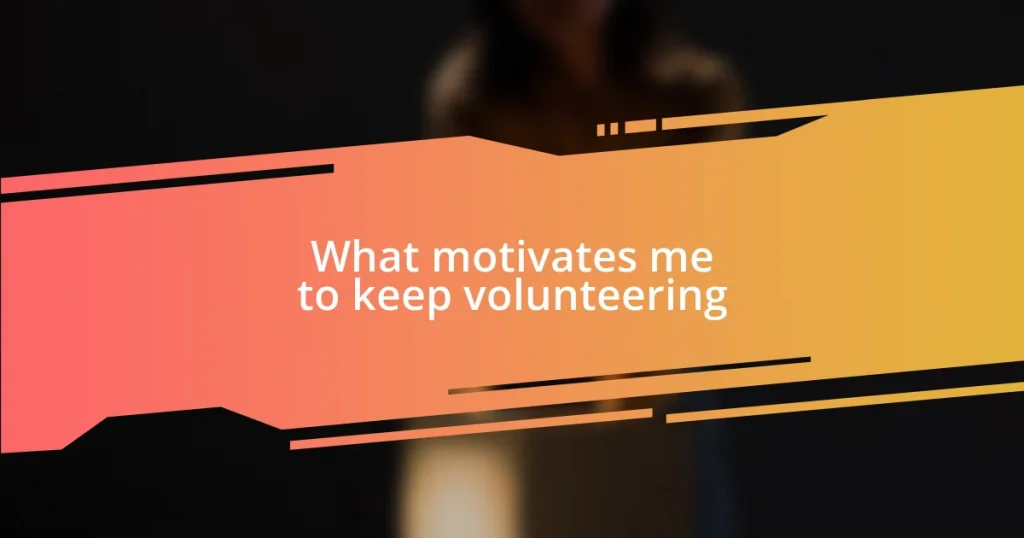Key takeaways:
- Recognizing signs of volunteer burnout, such as emotional exhaustion and diminished satisfaction, is crucial for addressing feelings of disengagement.
- Common causes of burnout include overcommitment, lack of recognition, and misalignment of personal values with the organization’s mission.
- Implementing strategies like setting realistic goals, seeking peer support, and reflecting on one’s volunteer journey can help maintain enthusiasm and prevent burnout.
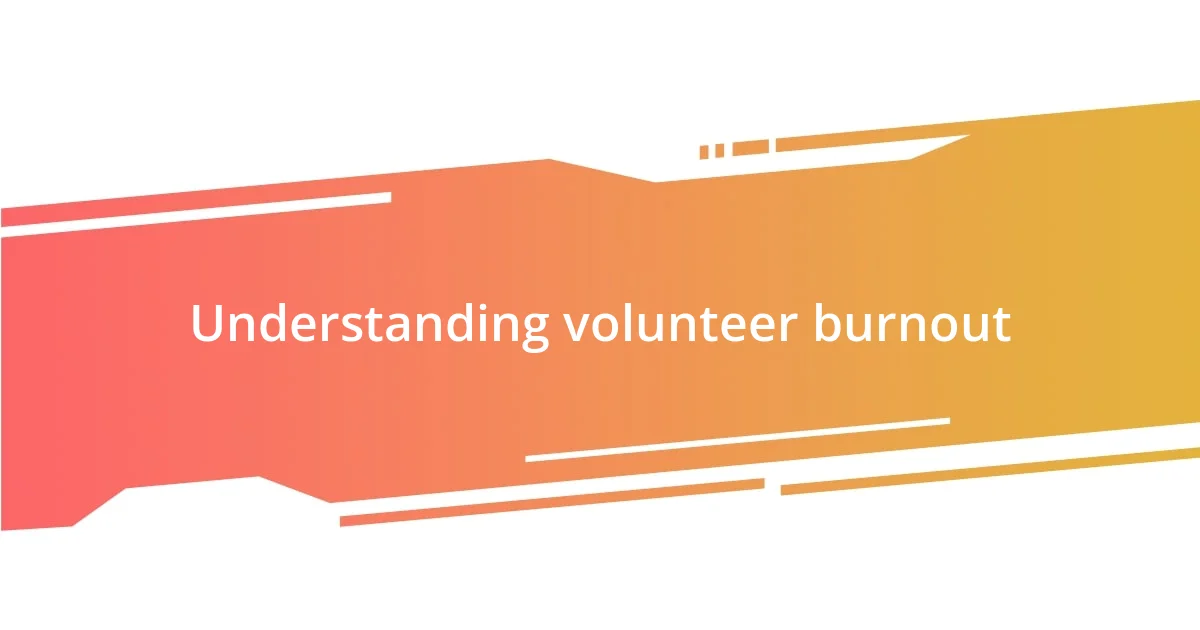
Understanding volunteer burnout
Volunteer burnout can sneak up on even the most passionate individuals. I recall a time when my enthusiasm for a local charity project dwindled as the demands piled up. I often found myself asking, “Is it still worth it?” Exhaustion can lead to a feeling of disillusionment, leaving volunteers questioning their impact and purpose.
What’s particularly tricky about volunteer burnout is that it often goes unrecognized until it’s too late. I remember chatting with a fellow volunteer who was visibly drained but insisted she was “fine.” It made me reflect on how many volunteers mask their discomfort, thinking they should push through for the sake of the cause, when in reality, acknowledging it is the first step towards healing.
The emotional toll can feel overwhelming, especially if you’re juggling multiple obligations. I vividly remember the day I realized I was dreading my volunteer shifts. It hit me that I needed to reassess my time and energy, not just for my sake but for the communities we serve. If you’ve ever felt this way, you’re not alone; recognizing these emotions is crucial in understanding and combating burnout.
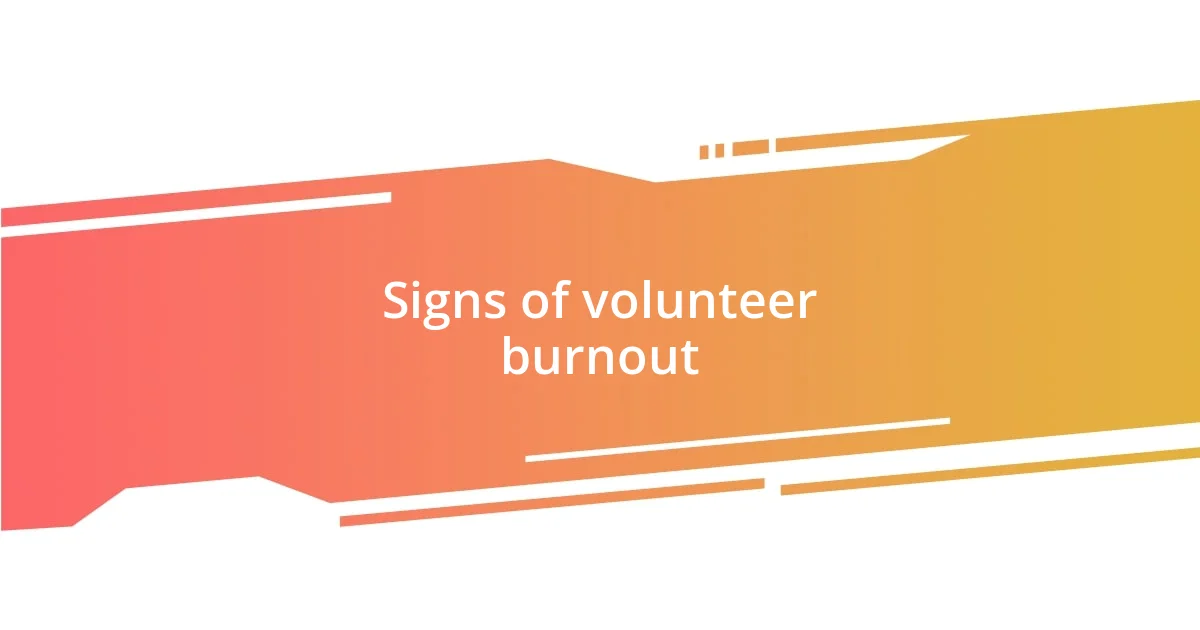
Signs of volunteer burnout
Recognizing the signs of volunteer burnout is essential for anyone involved in community work. In my experience, the symptoms can manifest in subtle yet significant ways. For instance, I noticed that my excitement for upcoming events slipped away, replaced by a nagging sense of dread. These feelings crept in slowly, often leading me to disengage from the very community I aimed to support.
Here are some key signs to look out for:
- Emotional exhaustion: Feeling drained after events instead of invigorated.
- Reduced performance: Recognizing a decline in your commitment or enthusiasm.
- Irritability: Becoming easily frustrated with tasks or fellow volunteers.
- Neglecting self-care: Skipping personal time or downtime.
- Diminished satisfaction: Questioning the value of your contributions.
- Withdrawal: Isolating yourself from your team or activities.
I remember a particularly challenging week when I skipped my usual volunteer meetings, opting instead to binge-watch shows. It felt like the only way to recharge, but I realized it was my mind attempting to escape the mounting pressure. This withdrawal, however, deepened my sense of isolation and guilt, revealing just how critical it is to recognize and address these burnout signs before they spiral further.
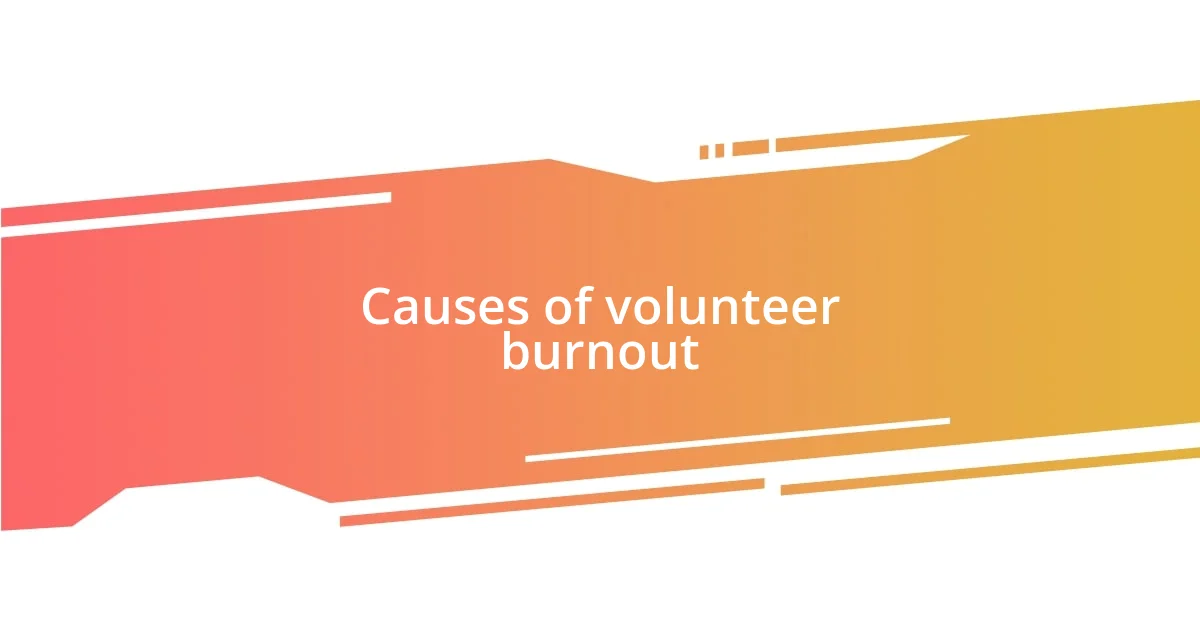
Causes of volunteer burnout
Volunteer burnout stems from various factors that often intertwine, creating a perfect storm of exhaustion and disengagement. One significant cause is taking on too much responsibility. I remember when I eagerly volunteered to lead multiple initiatives at once, thinking I could manage it all. However, I quickly found myself overwhelmed. The passion that initially fueled my involvement faded under the weight of looming deadlines and expectations. I learned that setting realistic boundaries was essential to maintain my energy and connection to the cause.
Another common culprit is the lack of recognition and support. It’s natural to desire acknowledgment for one’s efforts. I recall feeling invisible during a large community event—despite my hard work, it seemed no one noticed. This sense of invisibility can diminish a volunteer’s motivation and lead to feelings of isolation. When volunteers feel taken for granted, it can be detrimental to their engagement and sense of purpose, making it crucial for organizations to cultivate an environment of appreciation.
Finally, misalignment of personal values with the organization’s mission can also contribute to volunteer burnout. When the work starts to feel disconnected from one’s beliefs, it can lead to discontent. I experienced this firsthand when I found myself working on tasks that didn’t resonate with my core values. It became clear that volunteering should reinforce my passions, not deplete them. Understanding the causes of burnout is the first step toward healing, ensuring a meaningful and sustainable volunteer experience.
| Causes of Volunteer Burnout | Description |
|---|---|
| Overcommitment | Taking on too many responsibilities can overwhelm volunteers, leading to fatigue and frustration. |
| Lack of Recognition | Feeling undervalued or unnoticed can diminish motivation and create a sense of isolation. |
| Misalignment of Values | Working on tasks that conflict with personal values can lead to dissatisfaction and disengagement. |
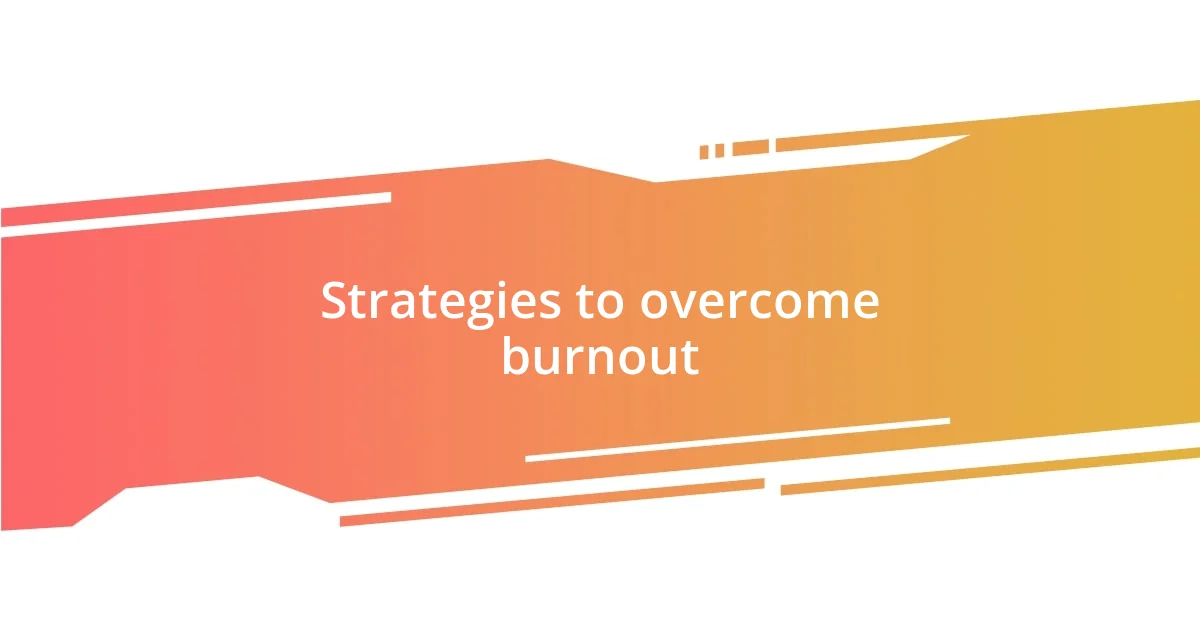
Strategies to overcome burnout
One effective strategy I embraced was learning to say “no.” I remember the first time I turned down a volunteer opportunity; it felt daunting. Yet, once I did it, I experienced an unexpected freedom. By prioritizing my commitments, I ensured that the tasks I took on were meaningful to me, reducing stress and allowing me to engage more fully when I was involved. Have you ever considered how liberating it could be to step back and reassess your commitments?
Another crucial approach was establishing boundaries. I began to set aside specific times for self-care, whether it was reading, hiking, or simply disconnecting from my volunteer commitments for a weekend. I discovered that by rejuvenating myself, I returned to my volunteer work with renewed passion and creativity. It was surprising to see how even a small amount of time dedicated solely to myself made a world of difference in my overall enthusiasm and effectiveness. Have you thought about what self-care practices you could integrate into your routine?
Additionally, seeking support from fellow volunteers proved invaluable. Sharing my feelings of burnout with others often led to engaging discussions about our collective experiences. This sense of community not only helped me feel less isolated but also inspired collaborative ways to make our volunteering more enjoyable and sustainable. Connecting with others who understood the struggle allowed us to uplift one another, creating a supportive network that made a huge impact. How might your volunteer group benefit from open conversations about burnout?
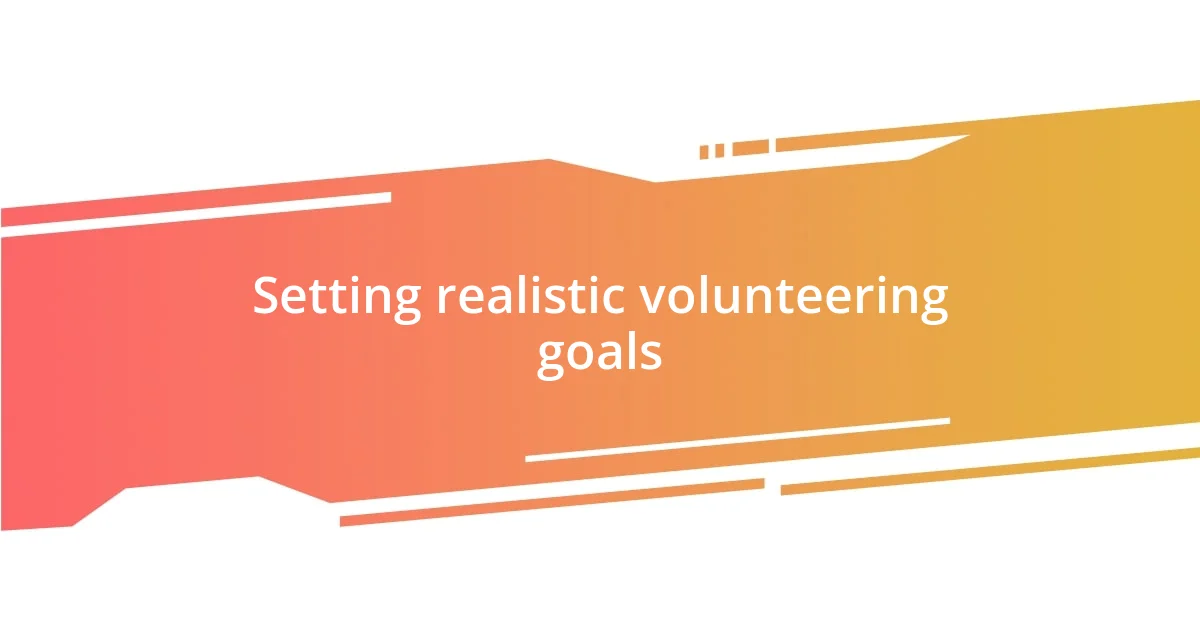
Setting realistic volunteering goals
Setting realistic volunteering goals can be a game-changer in preventing burnout. When I first started volunteering, I thought I should commit to every activity that came my way. The result? A packed schedule that left me drained and unfulfilled. Now, I focus on setting specific, achievable goals—like dedicating two weekends a month to a cause that deeply resonates with me. This approach not only keeps my enthusiasm alive but also enhances the quality of my contributions.
It’s essential to recognize the importance of quality over quantity. I vividly remember the time I aimed to participate in every community event—not because I was passionate about all of them, but out of a desire to appear dedicated. This spread me too thin. By honing in on just a few initiatives that align with my values, I’ve learned I can pour my energy into those efforts. Have you considered how much more impactful your contributions could be if you focused on what truly matters to you?
Moreover, revisiting my goals regularly has been crucial. I now set aside time each month to reflect on my volunteering experiences and adjust my commitments based on my current capacity and interests. It’s empowering to ask myself questions like, “Am I excited about this project?” or “Is this still worth my time?” This ongoing evaluation helps me maintain balance and prevents me from slipping back into overwhelm. What steps could you take to ensure your volunteering goals align with your well-being?
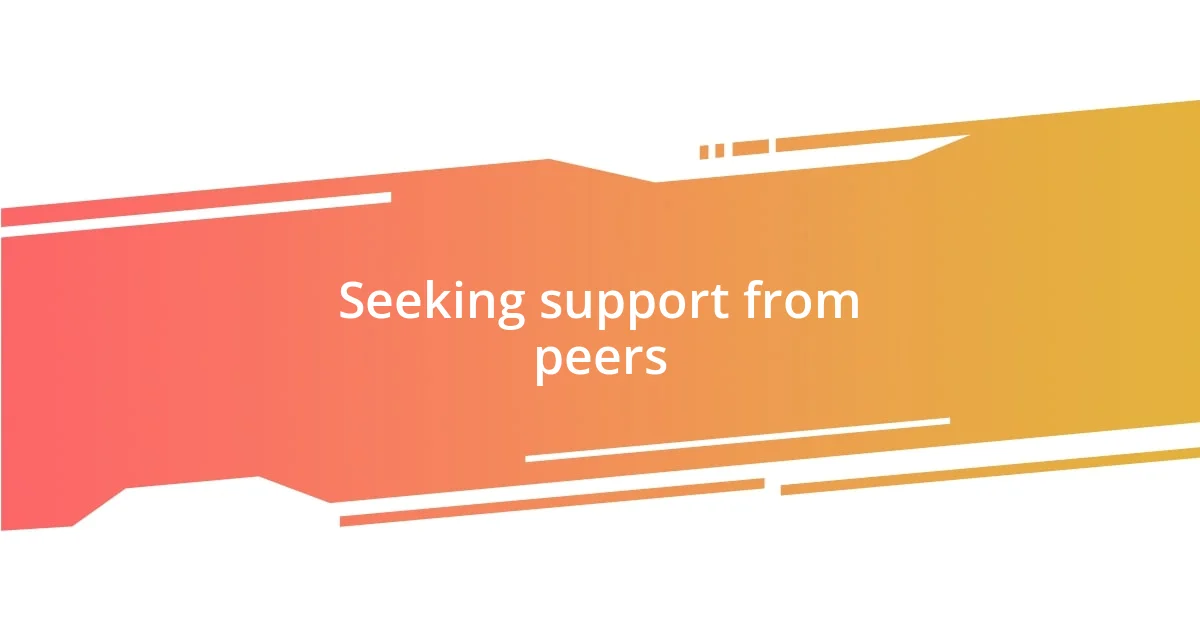
Seeking support from peers
When I felt overwhelmed by my volunteer commitments, reaching out to my peers proved to be a lifeline. One evening, after a particularly draining week, I shared my struggles during a casual meetup with other volunteers. Their responses ranged from understanding nods to shared stories of their own burnout, creating this sense of belonging that I desperately needed. This simple act of vulnerability not only unburdened me but also allowed us to brainstorm creative ways to share responsibilities, which significantly eased my load.
It’s astounding how a casual conversation can shift your perspective. I remember sitting down with a fellow volunteer, and we spent hours discussing our shared challenges. It was comforting to realize that I wasn’t alone in my feelings; many of us grappled with the same sense of exhaustion and pressure. This connection fostered a supportive environment where we could openly exchange ideas on maintaining our passion without feeling overwhelmed. Have you ever thought about how your own volunteer experience might improve simply by sharing your feelings with someone who understands?
The camaraderie I built with my peers also led us to establish a support system. We created a group chat where we could share tips, celebrate small victories, or vent about tough days. I vividly recall one afternoon when a teammate reached out for help launching a new initiative, and we all rallied around her. The energy in our collaboration was not just invigorating; it reignited my enthusiasm for volunteering as we collectively worked toward our shared goals. What if you initiated similar discussions within your own group? You might find that the support you receive could reignite your passion and make your volunteer journey far more rewarding.
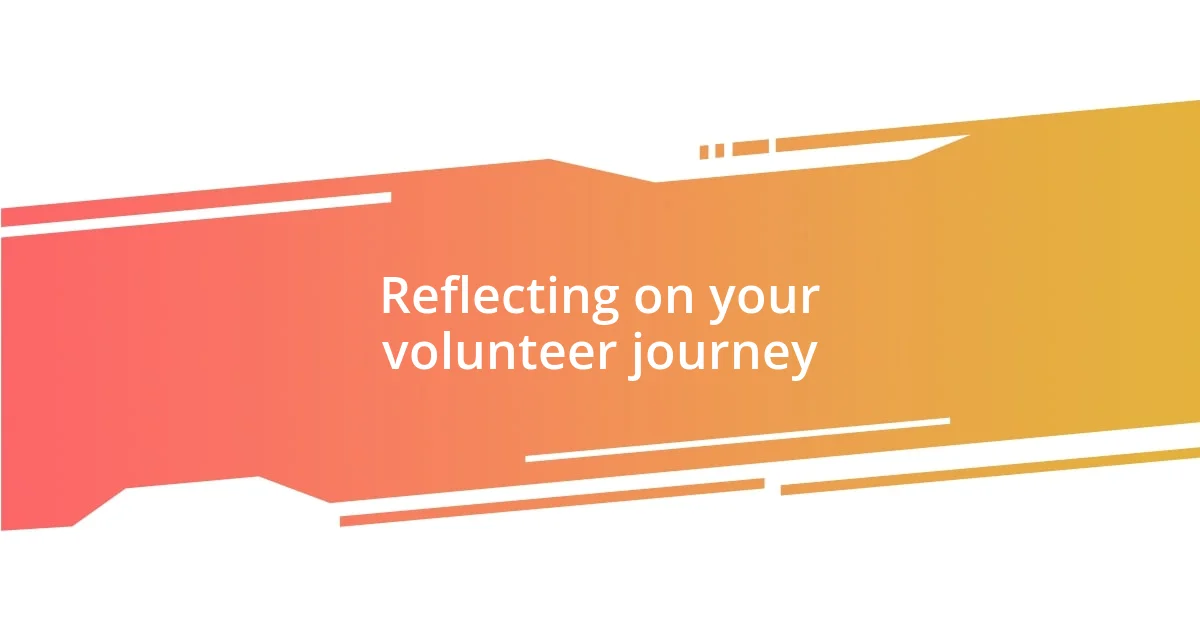
Reflecting on your volunteer journey
Reflecting on my volunteer journey has become an essential practice for me. I often find myself sitting quietly with my thoughts, sifting through the memories and emotions tied to each experience. Just last month, I approached this reflection with a journal in hand, jotting down both the highs and lows of my involvement. This simple act illuminated aspects I hadn’t considered before, allowing me to appreciate the growth that stemmed from my challenges.
One moment that stands out in my memory was a time when I felt completely disconnected from the cause I was supporting. As I revisited that experience, I realized it was my mindset that had shifted, rather than the project itself. I asked myself, “What did I learn from that?” This question unraveled valuable insights about my motivations and values, guiding me to choose more intentionally moving forward. Reflecting like this often stirs a mix of nostalgia and clarity; it’s both grounding and enlightening.
What’s remarkable is how these reflective moments often ignite a passion I thought had faded. There was a time when I second-guessed my impact after a particularly tough event, but by revisiting those feelings, I reclaimed my purpose. I’ve discovered that taking those pauses is not just beneficial; it’s necessary for sustaining my commitment. Have you taken a moment recently to reflect on your own journey? I can’t emphasize enough how these insights can transform your experience, keeping the flame of enthusiasm alive against the backdrop of burnout.


